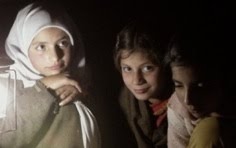 Though most of us know the genial red-suited Christmas gift-giver as Santa Claus or Father Christmas, in many countries there are traditions of gift-bringers known by other names.
Though most of us know the genial red-suited Christmas gift-giver as Santa Claus or Father Christmas, in many countries there are traditions of gift-bringers known by other names.In many East European countries, children wait for the Old Man of Christmas, Grandfather Christmas, or Grandfather Frost. A more common present-giving figure for Spain and several countries in South America would be Los Reyes Magos, or The Three Kings. Sweden has Jultomten or The Christmas Gnome, like Norway’s Julenissen, a small, elderly man. In Hungary it is the Angels who carry the Christmas gifts, or the child Jesus, who is also the gift-giver in places like in Italy, where he is known as Gesù bambino, as Austria has Christkind or Christ-Child.
Many of these bring gifts to children – and maybe to some adults! - not in December, but on January 6, celebrated in some places as the feast of the Three Wise Men.
Another interesting gift-bringer is La Befana, and several tender stories are attached to her presence.
She is a character in Italian folklore who delivers presents to children throughout Italy, on the eve of the 6th of January, filling their stockings with candy and presents if they are good or a lump of coal or dark candy if they are bad. With her reputation as a good housekeeper, many say she will sweep the floor before she leaves. The child's family typically leaves a small glass of wine and a plate with some food, often regional or local, for the Befana.
In depictions of her, she looks like the typical fairytale witch, hooked nose, black shawl, broomstick and all. But we story-lovers know, don’t we, how ‘witches’ were really wise women! [SEE 'THOSE UNLIKELY WISE WOMEN' ]
One story tells of the three Wise Men who were in search of the Christ child when they decided to stop at a small house to ask for directions. Upon knocking, an old woman holding a broom opened the door slightly ajar to see who was there. Standing at her doorstep were three tired men dressed in colorful robes. They asked for directions to where the baby Jesus might be found, but she did not know. Seeing how exhausted they were, she generously offered them shelter for the night, and the next morning before they left, they asked the old woman to join them on their sacred journey in thanks for her kindness to them.
She quickly declined their offer, saying she had way too much housework to do – sweeping and dusting, chopping wood and cooking for guests who might drop in – it really wasn’t possible. But after they left she felt as though she had made a terrible mistake, and packing a bag of gifts for the newborn, decided to go and catch up with the kind men. After many hours and days of searching she could not find them. Thinking of the opportunity she had missed the old woman stopped every child to give her or him a small treat from her bag.
Each year on the eve of the Epiphany she sets out, still looking for the baby Jesus. On her journey, she is said to leave all good children toys and candy, and in an attempt to get children to behave well, parents warn that naughty children get a chunk of coal or bags of ashes instead.
Another Christian legend takes on a sadder tone with La Befana being a woman with a child whom she greatly loved. However, her child died, and her resulting grief maddened her. Upon hearing news of Jesus being born, she set out to see him, delusional that he was her son. She eventually met Jesus and presented him with her gifts to make him happy. The infant Jesus was delighted, and he gave La Befana a gift in return - she would be the mother of every child in Italy.
I find it interesting that one take on her name is that it might be a mutation of Epifania , or Epiphany, which can be translated as ‘the display/appearance of divinity’; a flash of a revelation of a great, enduring truth. An epiphany then, is a deep understanding of the nature of the world that can change the way one looks at things
La Befana’s story, however it is told, invites us to stop and re-look at our own ‘reality’. What do we consider the ‘important’ things of our lives? What wonderful things might we be giving up while we continue to be trapped in the everyday? What new perspective can transform our grief, regret or sadness, bringing a new revelation, allowing us to reach out to others in caring and sharing?
May La Befana’s lessons be ours too as a new year begins! Marguerite Theophil
Stories can speak to us in several ways at once. The practical aspects of our personalities appreciate
the assistance they provide in prudent decision-making.
Our playful child-like energies find the stories to be great fun.
The quiet, spiritual side is grateful to have some time invested in reflection.
~ Jonathan Young
the assistance they provide in prudent decision-making.
Our playful child-like energies find the stories to be great fun.
The quiet, spiritual side is grateful to have some time invested in reflection.
~ Jonathan Young
